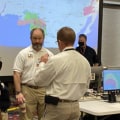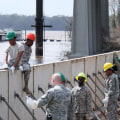When it comes to emergency response, Louisiana is well-equipped to handle any situation. The state has a unified and coordinated approach to the management of emergency incidents, allowing institutions and agencies with different legal, geographical and functional responsibilities to coordinate, plan and interact effectively. The Louisiana State Emergency Operations Plan (EOP) is the strategic decision-making body for emergencies, and it identifies state emergency support functions (ESF) as the structure for organizing and coordinating state resources by area of function. The Federal Emergency Management Agency (FEMA) provides guidance for the implementation of emergency assistance funding by law, regulation and policy.
Meanwhile, the Louisiana Disaster Act provides legal authority for state and local officials to prepare for, respond to, recover and mitigate disasters. Thanks to the state's flexible and responsive preparedness plan, 1,731 shelter residents were screened for health needs, 36 were referred for treatment, 1,300 were vaccinated against tetanus, and 7,805 emergency prescriptions were filled. Under state law, the governor, the GOHSEP (Governor's Office of Homeland Security and Emergency Preparedness), the director of the GOHSEP, the president of the parish, the director of the Parish Office of Homeland Security and Emergency Preparedness (OHSEP), and municipalities all have roles and responsibilities throughout the emergency management cycle. Each of the nine regions (Louisiana emergency management and HLS planning) is represented by an OHSEP parish director. The state UCG (Unified Command Group) is comprised of members appointed by executive order of the governor. It provides a unified and coordinated approach to the management of emergency incidents.
This allows institutions and agencies with different legal, geographical and functional responsibilities to coordinate, plan and interact effectively. In order to ensure that Louisiana is prepared for any emergency situation that may arise, it is important that all stakeholders understand their roles in the emergency management cycle. By understanding their roles in advance, they can be better prepared to respond quickly and effectively in an emergency situation.






